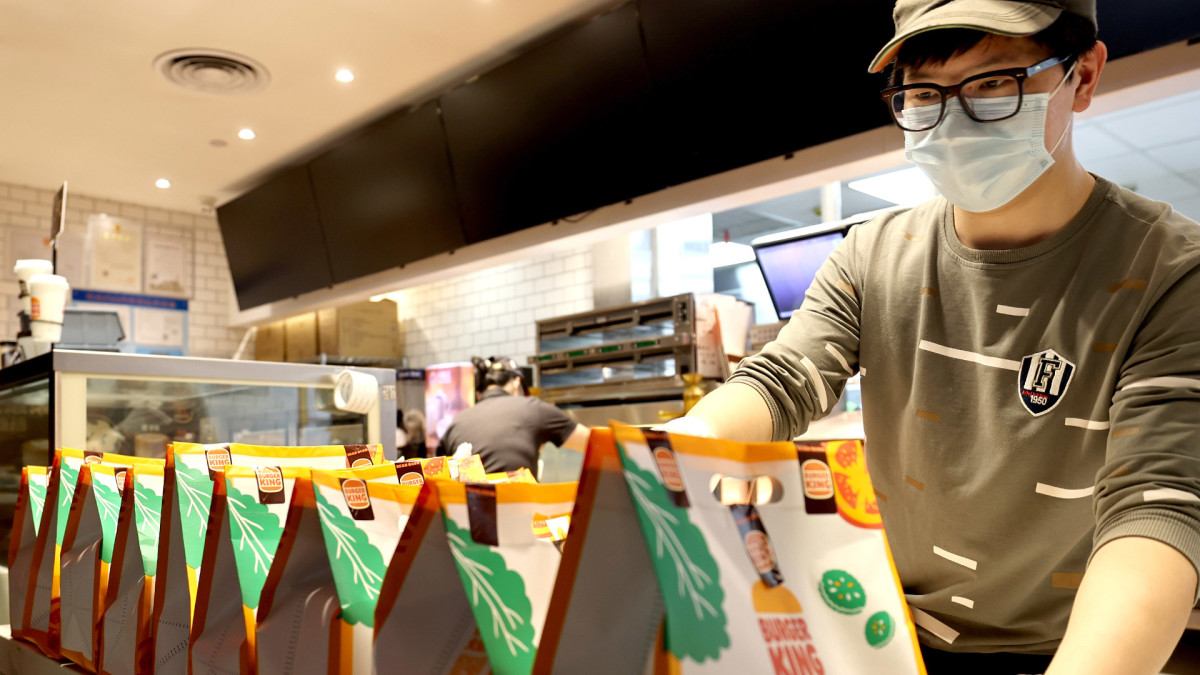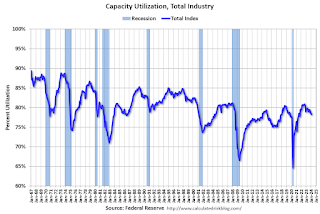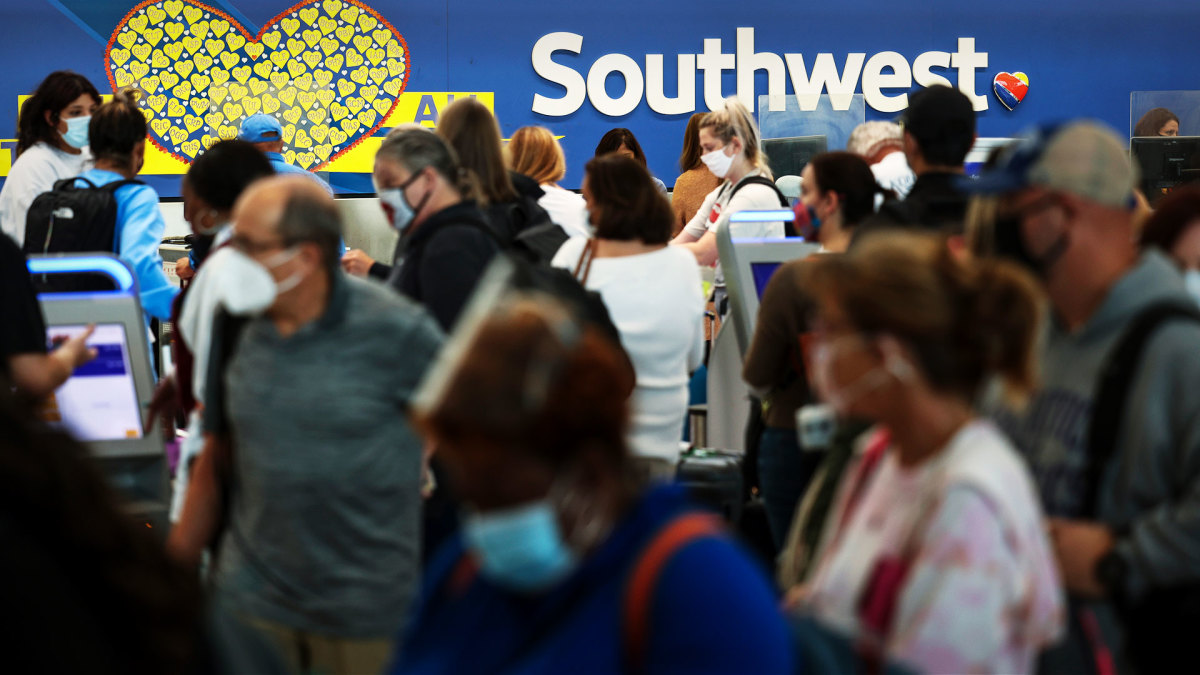Uncategorized
Harvard Gets More Bad News As Another Billionaire Cuts Ties Over Pro-Hamas Remarks
Harvard Gets More Bad News As Another Billionaire Cuts Ties Over Pro-Hamas Remarks
Authored by Tom Ozimek via The Epoch Times,
The Wexner…

Authored by Tom Ozimek via The Epoch Times,
The Wexner Foundation, a nonprofit founded by billionaire Leslie Wexner and his wife Abigail, has broken ties with Harvard University over the school's response to the Hamas terror attacks against Israelis and to an anti-Israel statement issued by student groups.
"We are stunned and sickened at the dismal failure of Harvard's leadership to take a clear and unequivocal stand against the barbaric murders of innocent Israeli civilians by terrorists last Saturday," the Wexner Foundation's leadership wrote to the Harvard board of overseers, in an Oct. 16 letter obtained by The Epoch Times.
Abigail and Leslie Wexner, whose fortune Forbes estimates at $6 billion, were among the signatories of the letter. The couple expressed their disappointment with Harvard's failure to condemn a shocking statement issued by 34 student groups that says Israel is entirely responsible for the violent attack carried out on Oct. 7 by Hamas terrorists.
Over 1,400 Israelis were killed in the terror attacks, the vast majority civilians, while some 200 were taken hostage. A member of the Israeli nongovernmental rescue and recovery service ZAKA said that at one Israeli community targeted by the attackers, roughly 80 percent of the 280 murdered victims bore signs of torture, including children.
Following the attacks, 34 student groups co-signed an Oct. 8 letter authored by the Harvard Undergraduate Palestine Solidarity Committee that held "the Israeli regime entirely responsible for all unfolding violence."
"Today's events did not occur in a vacuum," the letter said.
"The apartheid regime is the only one to blame. Israeli violence has structured every aspect of Palestinian existence for 75 years."
After Harvard was criticized for its silence on Hamas's deadly attacks and on the student letter, a chorus of alumni and professors rebuked the students' statement, including former Harvard president Larry Summers, who said the letter "sickened" him.
"The silence from Harvard's leadership, so far, coupled with a vocal and widely reported student groups' statement blaming Israel solely, has allowed Harvard to appear at best neutral toward acts of terror against the Jewish state of Israel," Mr. Summers wrote in a post on X.
Israeli billionaire Idan Ofer and his wife Batia quit a Harvard executive board in protest over how university leaders responded to the Hamas terror attacks.
"Unfortunately, our faith in the University's leadership has been broken and we cannot in good faith continue to support Harvard and its committees," the couple said in a statement to CNN.
Following the backlash, at least nine organizations that initially signed the letter withdrew their support.
'Tiptoeing, Equivocating'
Harvard University President Claudine Gay would later issue a brief statement condemning "the terrorist atrocities perpetrated by Hamas" while also noting that students "have the right to speak for themselves" but insisting that they don't speak on behalf of the university.
"We will all be well served in such a difficult moment by rhetoric that aims to illuminate and not inflame," she wrote.
"And I appeal to all of us in this community of learning to keep this in mind as our conversations continue."
But the Wexners said that Harvard's overall response to the Hamas atrocities wasn't good enough.
"Other university presidents have said precisely what we should have heard from President Gay: 'What Hamas did is evil and there is no defense for terrorism. This shouldn't be hard,'" the Wexners wrote, citing Ben Sasse, President of the University of Florida.
They accused Harvard leaders of "tiptoeing, equivocating, and we, like former Harvard President Larry Summers cannot 'fathom the administration's failure to disassociate the university and condemn the statement'" issued by the student groups.
The Wexners wrote that, in the absence of the kind of "clear moral stand" demonstrated by Mr. Summer's swift condemnation of the students' statement, the Wexner Foundation and Harvard "are no longer compatible partners."
"Our core values and those of Harvard no longer align," they wrote, adding that the Wexner Foundation was ending its financial and programmatic ties with Harvard and the Harvard Kennedy School.
CEOs Look to Blacklist Students Over Anti-Israel Letter
The negative reaction to the Harvard student groups' anti-Israel statement also extended to America's corporate boardrooms.
A number of CEOs of U.S. companies have expressed a willingness to blacklist Harvard students who blamed Israel for the violence perpetrated by Hamas.
Hedge fund manager Bill Ackman said in a post on X that he had been asked by several CEOs if the university would release a list of the members of each of the Harvard organizations that supported the letter “so as to [e]nsure that none of us inadvertently hire any of their members.”
“If, in fact, their members support the letter they have released, the names of the signatories should be made public so their views are publicly known,” Mr. Ackman said.
Mr. Ackman’s comments received support from a number of business leaders.
“I would like to know so I know never to hire these people,” Jonathan Neman, CEO of restaurant chain Sweetgreen, said in an X post.
“I second this,” Jake Wurzak, CEO of DoveHill Capital Management, said in a reply to Mr. Ackman’s post.
“We are in as well,” said Michael Broukhim, the CEO of lifestyle firm FabFitFun.
Some of the student organizations that signed the letter include the Harvard Jews for Liberation, the Harvard Prison Divest Coalition, and the Harvard Undergraduate Palestine Solidarity Committee.
Several groups later backtracked. According to the student newspaper of Harvard University, The Harvard Crimson, the Harvard Undergraduate Nepali Student Association, Harvard College Act on a Dream, Amnesty International at Harvard, and the Harvard Islamic Society have all backtracked on their support.
Another organization, the Harvard Undergraduate Ghungroo, released a statement on Instagram to "formally apologize," for signing the letter and retract their signature.
"We would like to clarify that we stand in solidarity with both Israeli and Palestinian Victims and Families," the statement said.
The students also "strongly" denounced and condemned the "massacre propagated by the terrorist organization Hamas."
"We truly apologize for the insensitivity of the statement that was released recently."
The PSC later amended the letter to hide the organizations who signed, citing safety concerns over ongoing harassment of students in those groups, even ones that graduated years ago and are no longer members.
Uncategorized
Fast-food chain closes restaurants after Chapter 11 bankruptcy
Several major fast-food chains recently have struggled to keep restaurants open.

Competition in the fast-food space has been brutal as operators deal with inflation, consumers who are worried about the economy and their jobs and, in recent months, the falling cost of eating at home.
Add in that many fast-food chains took on more debt during the covid pandemic and that labor costs are rising, and you have a perfect storm of problems.
It's a situation where Restaurant Brands International (QSR) has suffered as much as any company.
Related: Wendy's menu drops a fan favorite item, adds something new
Three major Burger King franchise operators filed for bankruptcy in 2023, and the chain saw hundreds of stores close. It also saw multiple Popeyes franchisees move into bankruptcy, with dozens of locations closing.
RBI also stepped in and purchased one of its key franchisees.
"Carrols is the largest Burger King franchisee in the United States today, operating 1,022 Burger King restaurants in 23 states that generated approximately $1.8 billion of system sales during the 12 months ended Sept. 30, 2023," RBI said in a news release. Carrols also owns and operates 60 Popeyes restaurants in six states."
The multichain company made the move after two of its large franchisees, Premier Kings and Meridian, saw multiple locations not purchased when they reached auction after Chapter 11 bankruptcy filings. In that case, RBI bought select locations but allowed others to close.

Image source: Chen Jianli/Xinhua via Getty
Another fast-food chain faces bankruptcy problems
Bojangles may not be as big a name as Burger King or Popeye's, but it's a popular chain with more than 800 restaurants in eight states.
"Bojangles is a Carolina-born restaurant chain specializing in craveable Southern chicken, biscuits and tea made fresh daily from real recipes, and with a friendly smile," the chain says on its website. "Founded in 1977 as a single location in Charlotte, our beloved brand continues to grow nationwide."
Like RBI, Bojangles uses a franchise model, which makes it dependent on the financial health of its operators. The company ultimately saw all its Maryland locations close due to the financial situation of one of its franchisees.
Unlike. RBI, Bojangles is not public — it was taken private by Durational Capital Management LP and Jordan Co. in 2018 — which means the company does not disclose its financial information to the public.
That makes it hard to know whether overall softness for the brand contributed to the chain seeing its five Maryland locations after a Chapter 11 bankruptcy filing.
Bojangles has a messy bankruptcy situation
Even though the locations still appear on the Bojangles website, they have been shuttered since late 2023. The locations were operated by Salim Kakakhail and Yavir Akbar Durranni. The partners operated under a variety of LLCs, including ABS Network, according to local news channel WUSA9.
The station reported that the owners face a state investigation over complaints of wage theft and fraudulent W2s. In November Durranni and ABS Network filed for bankruptcy in New Jersey, WUSA9 reported.
"Not only do former employees say these men owe them money, WUSA9 learned the former owners owe the state, too, and have over $69,000 in back property taxes."
Former employees also say that the restaurant would regularly purchase fried chicken from Popeyes and Safeway when it ran out in their stores, the station reported.
Bojangles sent the station a comment on the situation.
"The franchisee is no longer in the Bojangles system," the company said. "However, it is important to note in your coverage that franchisees are independent business owners who are licensed to operate a brand but have autonomy over many aspects of their business, including hiring employees and payroll responsibilities."
Kakakhail and Durranni did not respond to multiple requests for comment from WUSA9.
bankruptcy pandemicUncategorized
Industrial Production Increased 0.1% in February
From the Fed: Industrial Production and Capacity Utilization
Industrial production edged up 0.1 percent in February after declining 0.5 percent in January. In February, the output of manufacturing rose 0.8 percent and the index for mining climbed 2.2 p…

Industrial production edged up 0.1 percent in February after declining 0.5 percent in January. In February, the output of manufacturing rose 0.8 percent and the index for mining climbed 2.2 percent. Both gains partly reflected recoveries from weather-related declines in January. The index for utilities fell 7.5 percent in February because of warmer-than-typical temperatures. At 102.3 percent of its 2017 average, total industrial production in February was 0.2 percent below its year-earlier level. Capacity utilization for the industrial sector remained at 78.3 percent in February, a rate that is 1.3 percentage points below its long-run (1972–2023) average.Click on graph for larger image.
emphasis added
This graph shows Capacity Utilization. This series is up from the record low set in April 2020, and above the level in February 2020 (pre-pandemic).
Capacity utilization at 78.3% is 1.3% below the average from 1972 to 2022. This was below consensus expectations.
Note: y-axis doesn't start at zero to better show the change.
 The second graph shows industrial production since 1967.
The second graph shows industrial production since 1967.Industrial production increased to 102.3. This is above the pre-pandemic level.
Industrial production was above consensus expectations.
Uncategorized
Southwest and United Airlines have bad news for passengers
Both airlines are facing the same problem, one that could lead to higher airfares and fewer flight options.

Airlines operate in a market that's dictated by supply and demand: If more people want to fly a specific route than there are available seats, then tickets on those flights cost more.
That makes scheduling and predicting demand a huge part of maximizing revenue for airlines. There are, however, numerous factors that go into how airlines decide which flights to put on the schedule.
Related: Major airline faces Chapter 11 bankruptcy concerns
Every airport has only a certain number of gates, flight slots and runway capacity, limiting carriers' flexibility. That's why during times of high demand — like flights to Las Vegas during Super Bowl week — do not usually translate to airlines sending more planes to and from that destination.
Airlines generally do try to add capacity every year. That's become challenging as Boeing has struggled to keep up with demand for new airplanes. If you can't add airplanes, you can't grow your business. That's caused problems for the entire industry.
Every airline retires planes each year. In general, those get replaced by newer, better models that offer more efficiency and, in most cases, better passenger amenities.
If an airline can't get the planes it had hoped to add to its fleet in a given year, it can face capacity problems. And it's a problem that both Southwest Airlines (LUV) and United Airlines have addressed in a way that's inevitable but bad for passengers.
Image source: Kevin Dietsch/Getty Images
Southwest slows down its pilot hiring
In 2023, Southwest made a huge push to hire pilots. The airline lost thousands of pilots to retirement during the covid pandemic and it needed to replace them in order to build back to its 2019 capacity.
The airline successfully did that but will not continue that trend in 2024.
"Southwest plans to hire approximately 350 pilots this year, and no new-hire classes are scheduled after this month," Travel Weekly reported. "Last year, Southwest hired 1,916 pilots, according to pilot recruitment advisory firm Future & Active Pilot Advisors. The airline hired 1,140 pilots in 2022."
The slowdown in hiring directly relates to the airline expecting to grow capacity only in the low-single-digits percent in 2024.
"Moving into 2024, there is continued uncertainty around the timing of expected Boeing deliveries and the certification of the Max 7 aircraft. Our fleet plans remain nimble and currently differs from our contractual order book with Boeing," Southwest Airlines Chief Financial Officer Tammy Romo said during the airline's fourth-quarter-earnings call.
"We are planning for 79 aircraft deliveries this year and expect to retire roughly 45 700 and 4 800, resulting in a net expected increase of 30 aircraft this year."
That's very modest growth, which should not be enough of an increase in capacity to lower prices in any significant way.
United Airlines pauses pilot hiring
Boeing's (BA) struggles have had wide impact across the industry. United Airlines has also said it was going to pause hiring new pilots through the end of May.
United (UAL) Fight Operations Vice President Marc Champion explained the situation in a memo to the airline's staff.
"As you know, United has hundreds of new planes on order, and while we remain on path to be the fastest-growing airline in the industry, we just won't grow as fast as we thought we would in 2024 due to continued delays at Boeing," he said.
"For example, we had contractual deliveries for 80 Max 10s this year alone, but those aircraft aren't even certified yet, and it's impossible to know when they will arrive."
That's another blow to consumers hoping that multiple major carriers would grow capacity, putting pressure on fares. Until Boeing can get back on track, it's unlikely that competition between the large airlines will lead to lower fares.
In fact, it's possible that consumer demand will grow more than airline capacity which could push prices higher.
Related: Veteran fund manager picks favorite stocks for 2024
bankruptcy pandemic stocks-

 Uncategorized3 weeks ago
Uncategorized3 weeks agoAll Of The Elements Are In Place For An Economic Crisis Of Staggering Proportions
-

 International1 week ago
International1 week agoEyePoint poaches medical chief from Apellis; Sandoz CFO, longtime BioNTech exec to retire
-

 Uncategorized4 weeks ago
Uncategorized4 weeks agoCalifornia Counties Could Be Forced To Pay $300 Million To Cover COVID-Era Program
-

 Uncategorized3 weeks ago
Uncategorized3 weeks agoApparel Retailer Express Moving Toward Bankruptcy
-

 Uncategorized4 weeks ago
Uncategorized4 weeks agoIndustrial Production Decreased 0.1% in January
-

 International1 week ago
International1 week agoWalmart launches clever answer to Target’s new membership program
-

 Spread & Containment2 days ago
Spread & Containment2 days agoIFM’s Hat Trick and Reflections On Option-To-Buy M&A
-

 Uncategorized4 weeks ago
Uncategorized4 weeks agoRFK Jr: The Wuhan Cover-Up & The Rise Of The Biowarfare-Industrial Complex



















